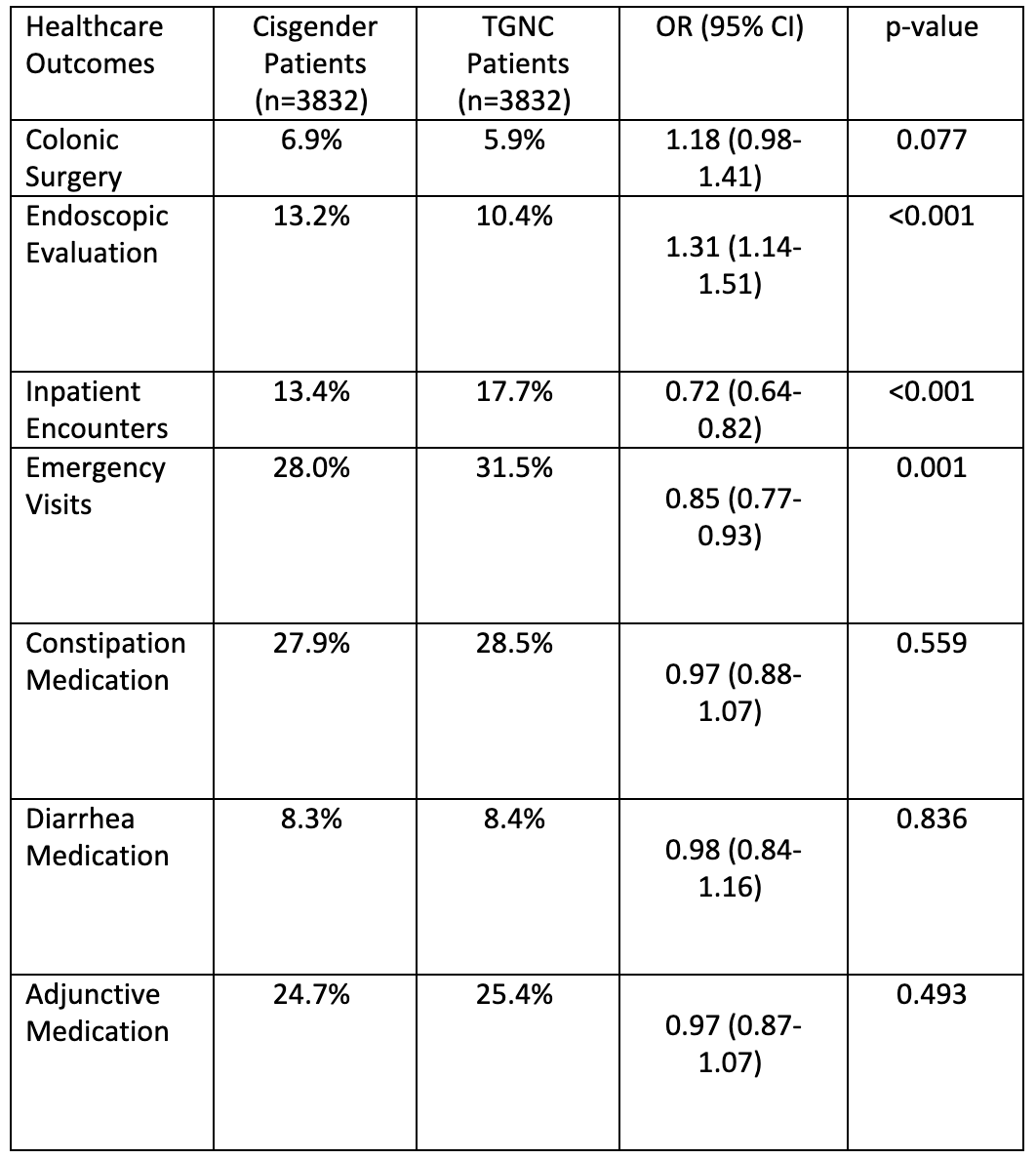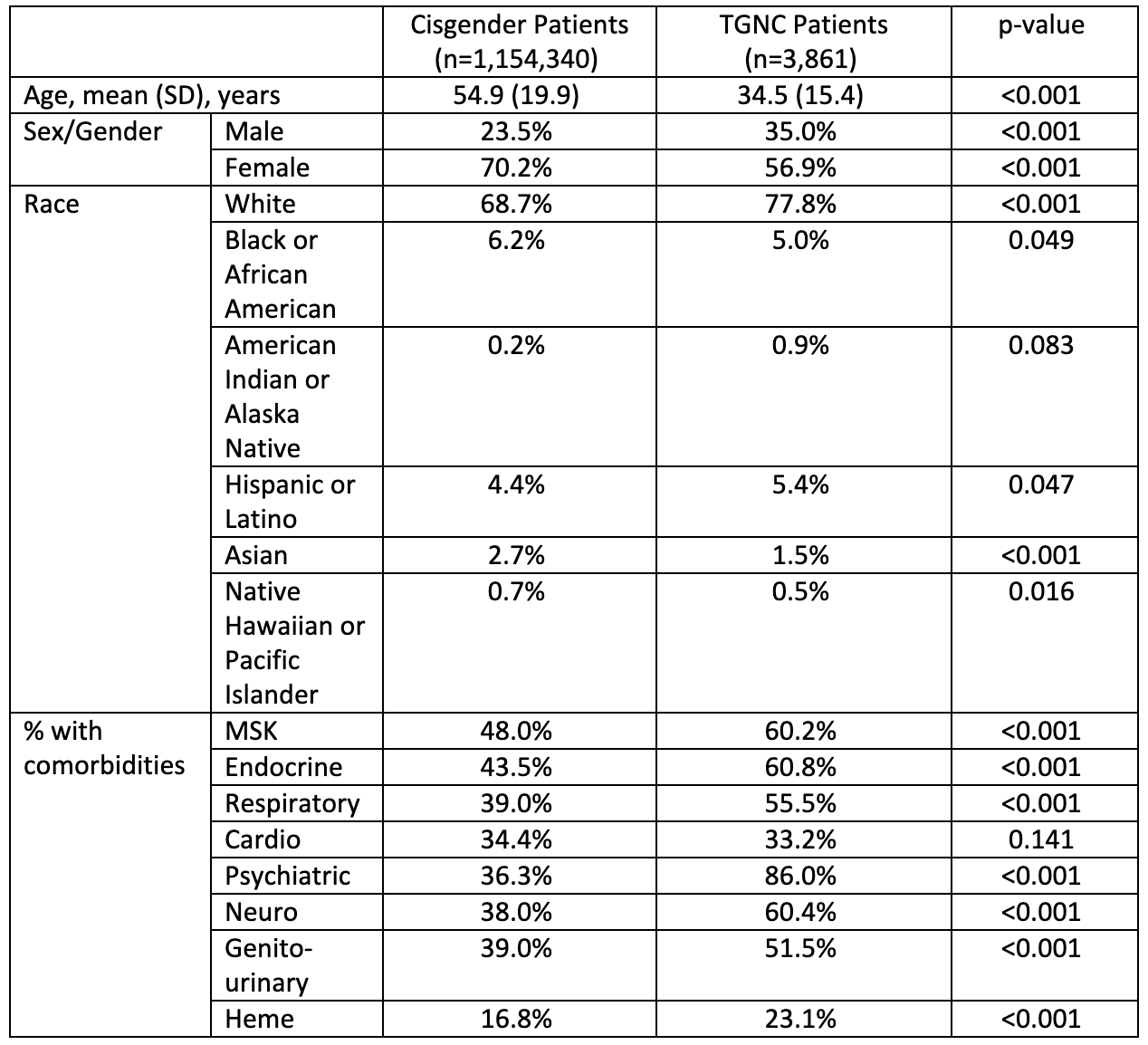Tuesday Poster Session
Category: Functional Bowel Disease
P5082 - Disparities in Healthcare and Utilization Between Cisgender versus Transgender and Gender Non-Conforming Patients With Irritable Bowel Syndrome
Tuesday, October 28, 2025
10:30 AM - 4:00 PM PDT
Location: Exhibit Hall

Andrew Suchan, MD (he/him/his)
Johns Hopkins University School of Medicine
Baltimore, MD
Presenting Author(s)
Andrew Suchan, MD, Lynn Kobeissi, MD
Johns Hopkins University School of Medicine, Baltimore, MD
Introduction: Irritable Bowel Syndrome (IBS) is a complex, biopsychosocial disorder of brain-gut interaction, comprising 20-30% of outpatient GI referrals. These patients utilize healthcare at greater rates, increasing costs and the risk of over-testing. Transgender and gender non-conforming patients (TGNC) are an underserved population with higher rates of chronic conditions, psychiatric illness, and healthcare utilization, where their connection to IBS has yet to be identified, especially regarding hormonal changes. This study explores disparities in medical services and utilization between cisgender and TGNC patients with IBS.
Methods: Using the TriNetX research database (accessed 12/2024), two cohorts of IBS patients were created using ICD codes for those with gender dysphoria and without. Demographic and rates of general comorbidities were obtained, and cohorts were matched by age and race. Outcomes included colonic surgery, endoscopy, inpatient and emergency visits, and prescriptions for anti-diarrheal, anti-constipation, or adjunctive medicines (e.g., anti-spasmodics, mirtazapine, or tricyclics).
Results: This study identified 1,154,340 cisgender and 3,861 TGNC IBS patients. After matching, each group included 3,832 patients. TGNC patients were generally younger and more likely to be male, white, or Hispanic. They had greater comorbidities (except cardiovascular) compared to cisgender patients, who were more likely to be female, Black, or Asian (Table 1). There was no difference in surgery rates or medication use. However, TGNC patients had more inpatient (17.7% vs 13.4%) and emergency encounters (31.5% vs 28.0%), while having fewer endoscopies (10.4% vs 13.2%) (Table 2).
Discussion: This research demonstrates significant differences in age and race between cohorts. Limitations in database classification obscure how they classify sex or gender for transgender patients, though the higher proportion of males in the TGNC group suggests more transmen with IBS than expected (despite transwomen begin more common overall), and more women assigned male at birth. As IBS is more prevalent in cisgender women, this raises questions about hormonal influences in disease development. TGNC patients had greater healthcare utilization but underwent fewer endoscopies, potentially reflecting underuse, discrimination, or differing symptom presentations. These findings highlight the need for further research into sex-gender differences in IBS and disparities in healthcare for TGNC patients.

Figure: Table 1. Baseline characteristics and comorbidities

Figure: Table 2. Outcomes and healthcare utilization
Disclosures:
Andrew Suchan indicated no relevant financial relationships.
Lynn Kobeissi indicated no relevant financial relationships.
Andrew Suchan, MD, Lynn Kobeissi, MD. P5082 - Disparities in Healthcare and Utilization Between Cisgender versus Transgender and Gender Non-Conforming Patients With Irritable Bowel Syndrome, ACG 2025 Annual Scientific Meeting Abstracts. Phoenix, AZ: American College of Gastroenterology.
Johns Hopkins University School of Medicine, Baltimore, MD
Introduction: Irritable Bowel Syndrome (IBS) is a complex, biopsychosocial disorder of brain-gut interaction, comprising 20-30% of outpatient GI referrals. These patients utilize healthcare at greater rates, increasing costs and the risk of over-testing. Transgender and gender non-conforming patients (TGNC) are an underserved population with higher rates of chronic conditions, psychiatric illness, and healthcare utilization, where their connection to IBS has yet to be identified, especially regarding hormonal changes. This study explores disparities in medical services and utilization between cisgender and TGNC patients with IBS.
Methods: Using the TriNetX research database (accessed 12/2024), two cohorts of IBS patients were created using ICD codes for those with gender dysphoria and without. Demographic and rates of general comorbidities were obtained, and cohorts were matched by age and race. Outcomes included colonic surgery, endoscopy, inpatient and emergency visits, and prescriptions for anti-diarrheal, anti-constipation, or adjunctive medicines (e.g., anti-spasmodics, mirtazapine, or tricyclics).
Results: This study identified 1,154,340 cisgender and 3,861 TGNC IBS patients. After matching, each group included 3,832 patients. TGNC patients were generally younger and more likely to be male, white, or Hispanic. They had greater comorbidities (except cardiovascular) compared to cisgender patients, who were more likely to be female, Black, or Asian (Table 1). There was no difference in surgery rates or medication use. However, TGNC patients had more inpatient (17.7% vs 13.4%) and emergency encounters (31.5% vs 28.0%), while having fewer endoscopies (10.4% vs 13.2%) (Table 2).
Discussion: This research demonstrates significant differences in age and race between cohorts. Limitations in database classification obscure how they classify sex or gender for transgender patients, though the higher proportion of males in the TGNC group suggests more transmen with IBS than expected (despite transwomen begin more common overall), and more women assigned male at birth. As IBS is more prevalent in cisgender women, this raises questions about hormonal influences in disease development. TGNC patients had greater healthcare utilization but underwent fewer endoscopies, potentially reflecting underuse, discrimination, or differing symptom presentations. These findings highlight the need for further research into sex-gender differences in IBS and disparities in healthcare for TGNC patients.

Figure: Table 1. Baseline characteristics and comorbidities

Figure: Table 2. Outcomes and healthcare utilization
Disclosures:
Andrew Suchan indicated no relevant financial relationships.
Lynn Kobeissi indicated no relevant financial relationships.
Andrew Suchan, MD, Lynn Kobeissi, MD. P5082 - Disparities in Healthcare and Utilization Between Cisgender versus Transgender and Gender Non-Conforming Patients With Irritable Bowel Syndrome, ACG 2025 Annual Scientific Meeting Abstracts. Phoenix, AZ: American College of Gastroenterology.
